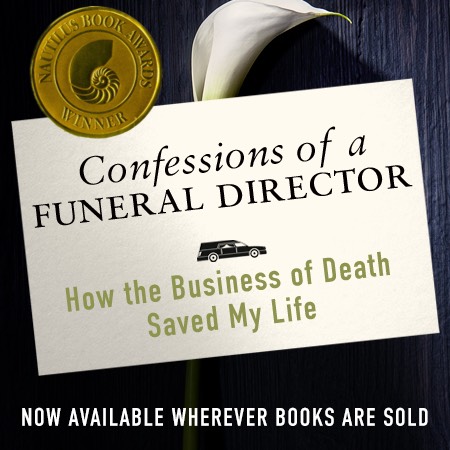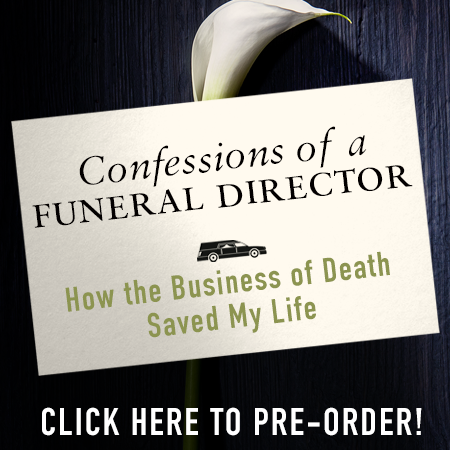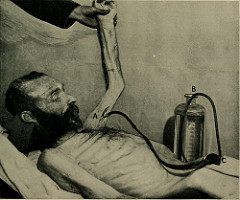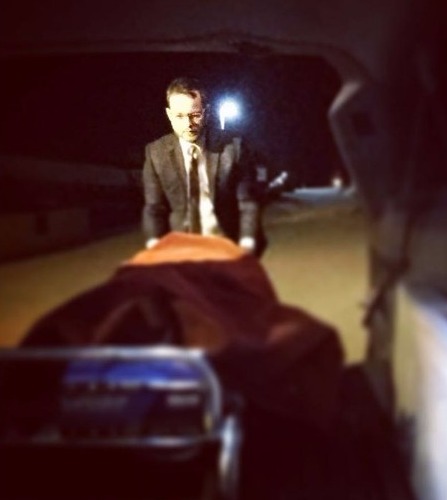Death
10 Things That Keep Funeral Directors Up at Night
One. Did I bury that wedding ring?
I know the family wanted the ring taken off before their mom was buried. They told me how important that ring is to them. And I’m almost certain I took the ring off after the service was over. But did I? It was all such a blur.
This question keeps me up for about an hour.
Two. Did I cut that pacemaker out?
We don’t own our own crematory. In our area, there are only about two funeral homes out of approximately 50 funerals that have their own oven. When someone we’re serving wants their family cremated, we send the deceased to a lovely family owned retort that does most of the cremations in a 20 mile radius.
If I leave the pacemaker in, it will explode during the cremation process, potentially causing damage that can have a $10,000 price tag. Sometimes I forget. Although rarely.
Keeps me up 20 minutes.
Three. Is that family gonna beat us?
We pride ourselves on being one of the lowest priced funeral homes in our area. And while this helps us sleep at night, the word has gotten around that not only are the Wildes inexpensive, but they don’t require payment up front. Many funeral homes, in an effort to protect themselves from crooked customers who have no intention of paying their funeral bill, require the funeral payment — or a guarantee of payment by an insurance agency — at the end of funeral arrangements. We give a 30 day payment period and we get swindled by about 10 to 15 families a year.
For the most part, we’ve become wise to the crooked families. But every once in a while there’s a family that is so good at working us, it’s only afterward that we see the signs and we lay awake at night realizing that we’ve been hustled.
10 minutes. It’s just money.
Four. I CAN’T BELIEVE THAT FAMILY BEAT US!!!
And then there are the families we’ve known for ages. The families who went to school with us. Who lived next to us. Who we played with as kids. The families we trust. Families that we never question. Months and months go by and finally, we’re laying in bed and we realize: THEY’RE NOT GOING TO PAY THEIR BILL!
This can be upsetting, especially if we know the family. It’s the broken trust part that can keep you up for two hours.
Five. Is that body going to stink?
Sometimes bodies smell. Sometimes embalming doesn’t stop the stink. And even though we do everything we can to cover up the smell, we can’t help laying in bed at night and wondering, “Is John Smith going to smell up the funeral tomorrow?”
Try to go to sleep as fast as I can so I can wake up early, get to the funeral home and double check John’s b.o.
Six. Twisted Visuals
I’ve been doing this for over a decade and I still see visuals that keep me up at night.
These kinds of visuals can keep me up AND find their way into my nightmares.
Seven. Night Calls
Night calls obviously keep us up at night. If someone dies at a nursing home or at their home in the middle of the night, we get up, suit ourselves up and off we go. This is what I look like the day after a night call:
Eight. How Long Can I Keep Doing this?
Career-doubt is a real thing. For me, the pace and the drain of death care undergirds a good amount of career-doubt. There are many times I miss my son’s life because I’m out at all hours of the day dealing with death. Night calls, night viewings, and the like make me less the father I want to be. I lay awake thinking about this.
This can keep me up for hours.
Nine. Was That Joke Too Awkward?
Okay. Maybe this is only me. I’m the king of awkward jokes. Sometimes the jokes are so awkward, I lay awake at night and repeatedly tell myself, “Caleb, you must never joke again. Caleb, you must never joke again ….”
Ten. What Did I Forget to Do?
Some days the funeral home feels like the floor of NYSE in that it’s all crazy and hectic and movement. The phone’s ringing with requests for reordered death certificates, the door bells ringing and there’s someone there who needs help with insurance policies, some of us are out picking up from a hospital, others are running around getting death certificates, and there’s a couple families are coming into the funeral home to make arrangements. After a hectic day where your brain felt like a Gallagher watermelon, you’re laying in bed at night and remember, “there was that phone call where the family wanted me to add the deceased’s cat ‘Jinx’ to the obituary … damn it.”
*****
If you like my writing, consider buying my 2017 Nautilus Book Award Gold Winner, Confession of a Funeral Director (click the image to go to the Amazon page):
And the Pastor said, “Cremation is a sin and anyone who is involved with cremation is a sinner.”
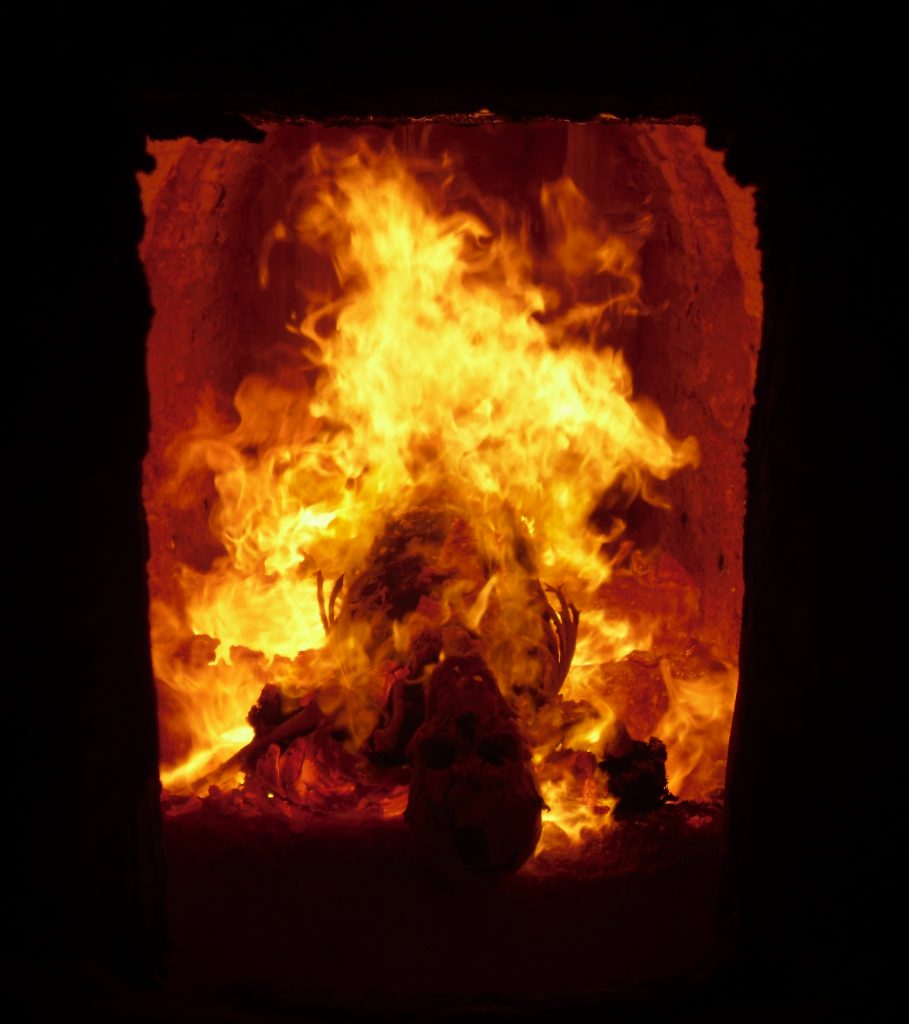
Creative Common License
This is what I was recently told by a Pastor who was scolding me for offering cremation to our customers. He was dead serious. I — as per my usual self — attempted to lighten the somber mood with a witty joke by saying that all the bodies I burn are dead, unlike the bodies of the heretics that the Church burned back in the day. The pastor didn’t appreciate my wit.
In a roundabout way, he may have been hoping he’d find me sympathetic to his anti-cremation stance. There’s a number of funeral directors who conveniently, albeit privately, believe that cremation is wrong. Those private beliefs become public when their customers ask. See, cremation is much cheaper than embalming and cuts into the funeral home’s bottom line and therefore the funeral director’s pocket; couple that ulterior motive with the folk belief that cremation destroys God’s creation and you have a recipe for an anti-cremation funeral director.
This pastor, though, didn’t find a sympathizer in me. So the pastor and I sat in silence for what felt like a couple minutes until I took a different approach to the conversation.
The view that cremation is wrong isn’t uncommon among pastors. I’ve had more than a handful of pastors tell me cremation is a no-no. But it’s not only pastors who take this stance; two of the major world religions and some branches of Christianity also disallow cremation.
For instance, Jewish law is unequivocal that a body must be buried. Those of us who aren’t Jewish have a lot to learn from Jewish burial practices, specifically as it relates to home funerals and green burials, but most of us, like myself, simply don’t believe that burning a body is violating G-d’s creation. The heart of this prohibition against cremation is that humans are created in the image of G-d and so we shouldn’t intentionally harm the body, dead or alive.
Islam too believes that cremation is wrong, but for different reasons and with a much higher level of “no-no”. Islam believes cremation to be haram, which is something that is expressly forbidden by Allah and entirely sinful. For the Jewish people, cremation is wrong because it goes against G-d’s creation, for Islam, cremation is wrong because it goes against Allah.
Christians, like my pastor friend, are a mixed bag when it comes to cremation. Eastern Orthodoxy believes that cremation is wrong for the same reason Jewish law forbids it.
The Catholic Church was anti-cremation up until about fifty-years ago. Now, the official position of the Catholic Church is this:
“The Church earnestly recommends that the pious custom of burying the bodies of the deceased be observed; nevertheless, the Church does not prohibit cremation unless it was chosen for reasons contrary to Christian doctrine.”
And that “nevertheless” was only added in the mid-1960s during Vatican II. Before that, cremation was a seen an abandonment of the hope of resurrection, and, like Judaism and Orthodoxy, abuse of the creation of God.
After the pastor and I sat in silence for a couple minutes, the Pastor piped back up:, “I feel so strongly about this topic that I’ve preached a sermon series on it.”
At this point, I realized that my witty joke had probably done more harm than good. I love pastors because I’ve seen how much good they do during death and dying. For the most part, pastors are generous and loving during death, and this pastor was no different. I honestly didn’t want to ridicule his beliefs and I didn’t want to say something that would jeopardize our friendship.
So, here’s what I said with as much good will as I could: “Pastor, for most people in our area, cremation isn’t a theological issue, it’s a practical issue. People who choose cremation aren’t attempting to disrespect God, nor are they denying the resurrection, nor do they believe that our bodies are toys that we can abuse. Most people choose the less expensive cremation because embalming, buying a casket, buying a grave, buying a vault and paying us funeral directors to organize the whole thing isn’t in their budget.”
He sat in silence, so I continued.
“I’m not a pastor, so I’m not going to share my views on God, but I know a lot of folks without insurance or an irrevocable burial reserve who would have to take out a loan to pay for something other than cremation.”
I stopped there because I didn’t want to sound like I was lecturing him. But, if I had kept going, and I would have shared my views on God, I would have mentioned that my belief is that God values everything in life, but God seems to specifically value love and community … that death creates community, whether it be an embalmed body or a cremated body. And that God doesn’t’ want us to mortgage the house for a full burial and that God certainly doesn’t want us to feel guilty when choosing cremation.
And this, my friends, is the bottom line: funerals are to bring us together, not tear us apart. If we guilt and shame cremation, I don’t believe that helps us, nor does it help to create community. Community, love, and shared grief is what makes a good death, not your method of disposition.
*****
If you like my writing, consider buying my 2017 Nautilus Book Award Gold Winner, Confession of a Funeral Director (click the image to go to the Amazon page):
Let’s Stop Throwing the Dead Out with the Trash
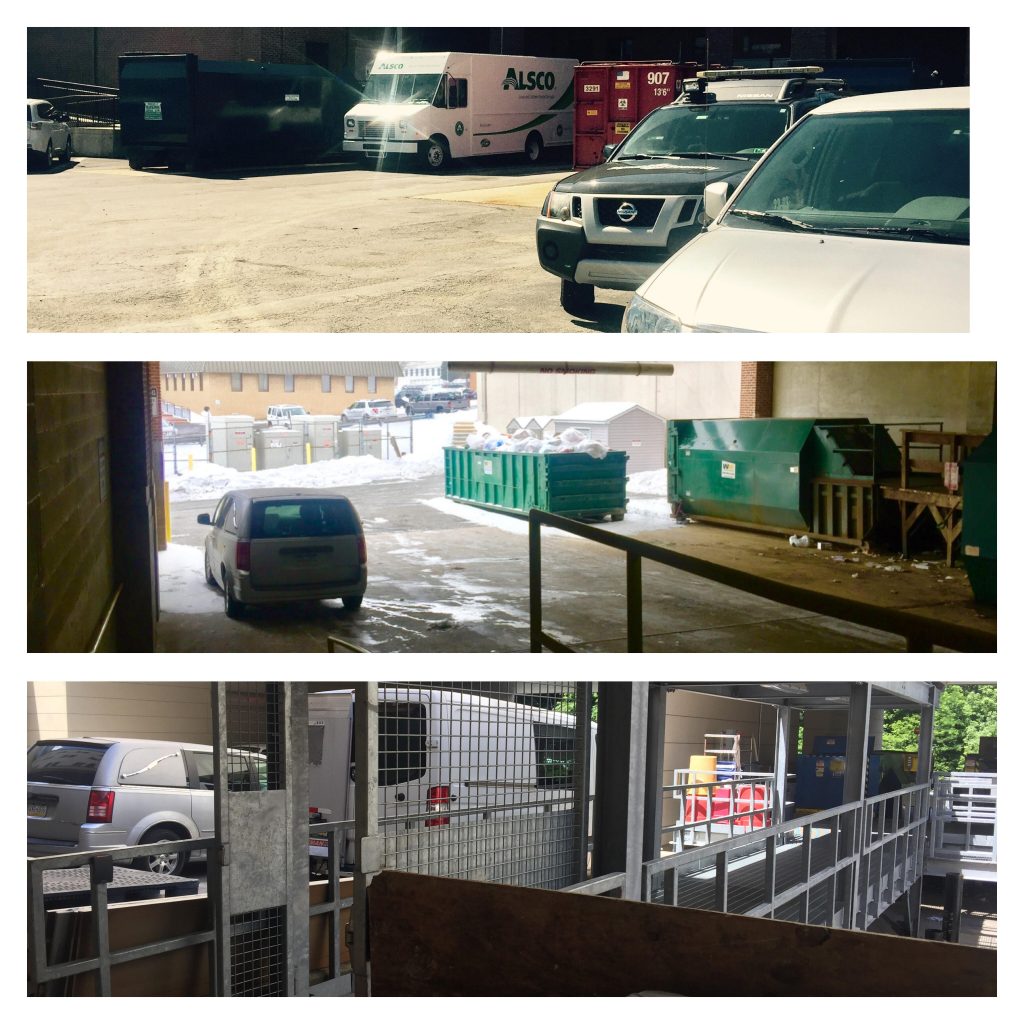
Most funeral directors will tell you that when you go to a hospital to pick up a deceased person, you’ll most likely park your removal van or hearse in the same area where the hospital throws out the trash.
The above photo montage is from three local hospitals in my area. In each case, we park the removal van at the same area where they take out the trash. Certainly, the hospitals aren’t implying that the dead are trash, but what they are implying is that both the body and the hospital’s trash should be hidden from the public view.
I want to contrast those pictures with this picture from Lisa B., who gave me permission me to share this photo:
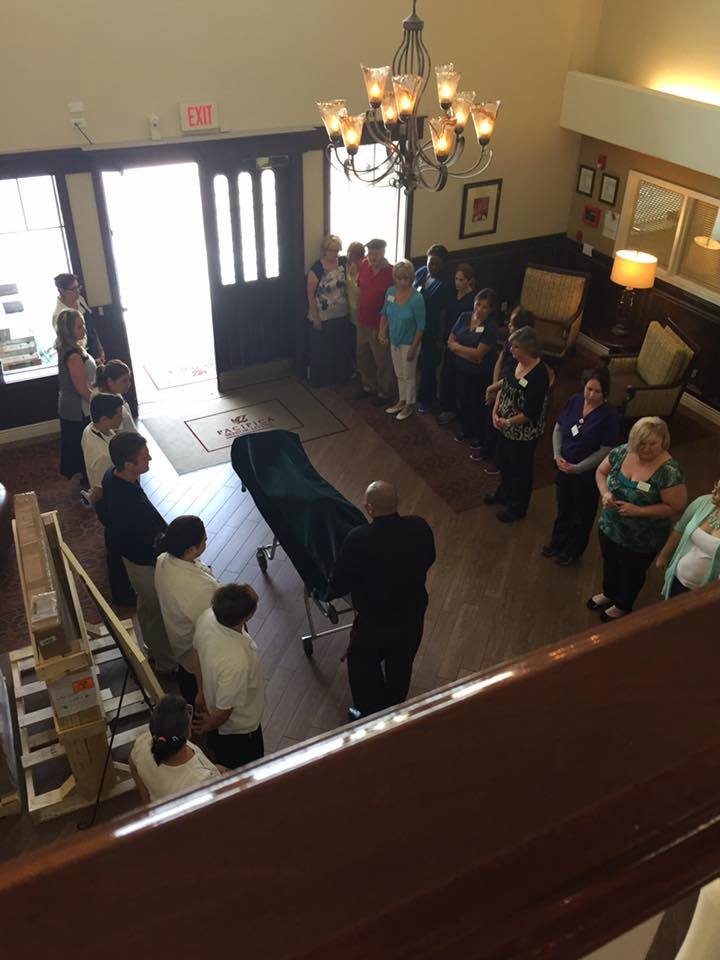
Here are the context and the backstory behind this photo:
A couple months ago I shared a beautiful experience I had at a nursing home. As I shared in that post, when we funeral directors come to remove a deceased person from a nursing home, most nursing homes have a “hide the body” mentality or a “back door policy” that ushers the deceased out the back door so no one sees it.
As I’ve come to find out, some nursing homes have a “front door policy” where the death is acknowledged and the dead honored by the nursing home and its staff. My recent experience with this “front door policy” included the nursing staff creating a walk of honor. The staff lined the hallway walls as I left the nursing home with the deceased, acknowledging the life lived and lost.
When I shared my experience with the “front door policy” and the “walk of honor”, Lisa B. shared this beautiful photo of how her grandfather’s nursing home practiced this acknowledgment of death when her grandfather died. As you can see, the staff is creating this beautiful walk of honor to acknowledge the passing of Lisa’s grandfather as he leaves the nursing home. I asked Lisa if I could share the photo with you and she gave me permission.
This act, my friends, is a beautiful step away from death denial and towards death positivity.
Nursing homes who adopt the “front door policy” deserve all the praise in the world. And I think hospitals need to take notice. I’m not suggesting that hospitals adopt a “front door policy” because I’m not so naive to think that nursing homes and hospitals are similar spaces. They are not. But, they aren’t entirely different.
Finding ways to embrace our dead, instead of hiding them, is all a part of death positivity. We don’t need to fear our dead. We don’t need to hide them. We don’t need to be ashamed of them. Instead, we need to welcome the dead into our lives and allow them spaces among the living. However that looks at a hospital, I don’t know. But I do know that sending the dead out the same door as the trash isn’t it.
If you’re interested in more stories and thoughts like this, you might like to preorder my book:
10 Things Embalmers Can’t Fix
In the world of embalming, there are a couple embalmers who are damn near miracle works. Legends of the industry. When I was in school, our embalming professor worshiped an embalmer named “Jack Adams.”
If the funeral industry had saints, Jack Adams has worked enough miracles to be canonized a couple times over. But there are only a few saints. The rest of us are just human, with limited tricks and limits to our art. And there are some things that the mass majority of us can’t fix (although some embalmers will likely differ with this list because we embalmers are a vexed and opinioned bunch). Here’s ten:
ONE. A couple years ago, a funeral director friend of mine picked up a dead man in his 60s from the hospital with black pigmented skin. The deceased’s wife was black. His children were black. And my funeral director friend assumed that the deceased was black. The day of the service the wife walked into the church to view the body and yelled, “That’s not my husband! My husband is white!” It was, in fact, her husband, but unknown to the funeral director, the drugs that were given to the dead guy by the hospital, coupled with his cause of death had stained his skin black. I thought that my friend was exaggerating, that maybe it was Formaldehyde Gray, but when I saw the pictures (that were taken for lawsuit purposes) there was nothing gray about this man’s skin. This is incredibly rare. I’ve never seen it, nor has my grandfather who has embalmed nearly 10,000 bodies, but sometimes the circumstances and the body combine for some distinct changes that embalmers can’t entirely change.
TWO. TISSUE GAS (aka Clostridium perfringens). The words that strike fear into the heart of the embalmer. Tissue gas results from an organism that duplicates itself every six minutes, causing a normal dead body to totally change in a matter of hours. Tissue gas is so contagious that if it gets on our embalming instruments, it will spread to the other bodies. It’s like the movie Outbreak but in a morgue. And once it takes over, we pray for a cure, but that prayer is rarely answered.
THREE. DISMEMBERMENT Amazingly, we can fix some kinds of dismemberment. If a person is decapitated in a clean fashion at the neck, it’s possible — although unlikely — for us to make things work. But, say a person is laying down on a train track and cut down the middle from pelvis to head, it’s possible to embalm them if we can find the arteries, but restoring them is a no-go.
FOUR. UGLY. Unfortunately, I can’t make you look like Brad Pitt or Cindy Crawford.
FIVE. DECOMPOSITION My Great Uncle (a funeral director for over 50 years) served in the Grave Registration Unit during the Korean War. His group was responsible for embalming the soldiers lost in battle. As you can imagine, some of the soldiers came back in stages of advanced decomposition, rendering arterial embalming a near impossibility. So, instead of arterial embalming, they’d do what my Uncle called “pickling”. There was a small swimming pool of embalming fluid and they’d drop the bodies in the pool and let the bodies soak until they were pickled enough to be shipped back home. As a side note, my Great Uncles entire unit would eventually die from lung cancer from breathing in the fumes of the embalming pool.
SIX. SERIOUS BURNS ON THE FACE. We can’t fix that.
SEVEN. POSTMORTEM STAIN “That doesn’t look like my son!” she yelled as she viewed her 45-year-old boy for the first time since his overdose. I had prepared her for what she was about to see. I told her that he had laid for a long time on his face. That there was distention. That we had to use opaque makeup because of the postmortem stain. That postmortem stain is very difficult to remove with embalming. And that he wouldn’t look like she remembered. “I still want to see him,” she said. And so she did.
EIGHT. SEVERE RHEUMATOID ARTHRITIS, HUNCHBACK, OR ANY OTHER SKELETAL DEFORMITY. When a person has been bedridden for an extended period of time (usually in a nursing home), their posture can suffer severe deformity from a number of causes (note: it can be caused by improper nursing care, but usually it’s simply caused by immobility). Although it’s rare, some families leave their family member in a nursing home for years on end without visiting them. And sometimes the nursing home residents can suffer deformity over the course of those years, which is an unwelcome surprise when the living family sees the deceased lying in a mangled position in a casket. We can correct some deformity, but most are skeletal and can’t be repositioned.
NINE. JAUNDICE GREEN. Normal jaundice is yellow, but when too much embalming fluid is pumped into a body that yellow turns to a Gamora colored green. Once you go Gamora, you don’t go back. We’ve created a problem we can only fix with opaque cosmetics that can look like a spray tan gone wrong.
TEN. THE ONE-THIRD RULE. Generally speaking, if one-third (or more) of the head is disfigured, it’s unlikely we can fix it. We can try. We can put hours and hours into restoration. We can piece the bones back together, wax over the deep cuts and wounds, spray the wax to get a uniform color, and maybe, just maybe, we can pull off something that resembles the deceased. Or, we can call in a miracle from Jack Adams and he can do his wonders for a couple thousand bucks.
*****
If you like my writing, consider buying my 2017 Nautilus Book Award Gold Winner, Confession of a Funeral Director (click the image to go to the Amazon page):
The 10 Hardest Parts of the Funeral Industry
Each and every job has its hard parts. Here are 10 aspects of the funeral industry that I find difficult.
One. The Silence
Silence is the voice of death. It’s antithetical to the pursuit of Americans. Most of us are programmed to want answers to our questions, truth to our doubts, words to our emptiness and meaning to our voids. But when I’m sitting with a family making arrangements for their dead loved one’s funeral, sometimes I look them in the eye, I say “I’m sorry for your loss”, and then comes the most difficult of all things: the absence of answers, the lack of truth, the void of our existence and the silence of death. We just sit, acknowledge the silence, and embrace the sacred moment.
Two. The Money
Aside from the silence, tallying up the bill is always difficult for me. It’s not that our funeral home is expensive. We pride ourselves on being the least expensive funeral home in our area. It’s not that we’re trying to rip people off. We do believe our prices are fair and honest. It’s just that bringing up money when we’re talking about death seems like sacrilege. Sure, we have to pay our bills. Sure, paychecks are good. It’s just difficult for me, and I imagine many other funeral directors as well, to capitalize on death.
Three. Flirting
Having mature women flirt with me is … not that difficult. Yeah, I actually like that part. What funeral director doesn’t mind the occasional, “If I was 40 years younger” comment?
Four. Tragic deaths
These are the kind of deaths that come home with us. You just can’t help it. There’s not a funeral director that isn’t affected by the death of a child, the car accident, the overdose or the suicide.
Five. Transference
Some people have major problems and baggage that get fanned to flame by grief and bereavement. Often times, they take their problems, their anger, their frustration and instead of dealing with their grief and bereavement, they take it out on us. If you’ve been in the business long enough, you know not to take it personally, but it’s nonetheless difficult to take a capricious verbal lashing for no apparent reason other than transference.
Six. Morticians not Magicians
There are some faces that we can’t restore.
Some bodies that are too far gone.
Sometimes it’s nearly impossible to make the dead look alive.
Sometimes, the process of securing a doctor’s signature, getting cremation approval from the county and the line up at the crematory means we can have everything finished in the time you want it to be.
I wish we had a magic wand, but there are things we can’t do. Wishing we could, but knowing we can’t isn’t an easy idea for you to accept, but it’s even more difficult for us to accept as we like to think we’re more capable than we really are.
Seven. The Night Calls
There’s no amount of coffee that can compensate for the lack of sleep caused by a 2 AM night call.
Eight. Meeting Our Own Demons
There are certain things in life, like marriage, or our kids, that have a tendency to summon our hidden demons. I’ve often said that I was a great person before I got married and then I saw just how selfish and prideful I really am. Death and the funeral industry can have a similar effect. Death culture is like the refining of gold; all of our impurities, our stress, our own anxiety, and our pride can come seeping out in the heat of the moment. But that very heat, while revealing our difficult demons, can also purify us and make us more beautiful.
Nine. Dress clothing
I like nice suits and I’m an absolute shoe addict, but wearing a suit on a sweltering mid-summer Pennsylvania day is an exquisite form of torture. I don’t believe in hell, but wearing a black suit in 100-degree weather is pretty damn close.
Ten. Personal Relationship Strain
I suppose every friend will disappoint you once in a while; but funeral directors will probably do it more often. We might miss your birthday party, we might have to leave in the middle of dinner.
Death has this way of keeping an untimely schedule. And as death’s minions, we’re tied to that schedule. Whether it be in the middle of the night, or in the middle of your wedding, when death calls, we have to respond. That respond-ability marks having a personal relationship with us somewhat difficult.
*****
If you like my writing, consider buying my 2017 Nautilus Book Award Gold Winner, Confession of a Funeral Director (click the image to go to the Amazon page):

